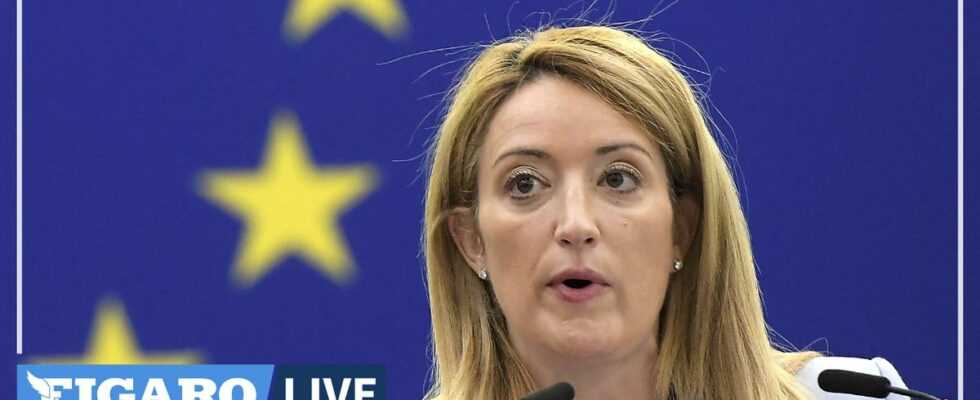The Twenty-Seven also announced a ban on exports to Russia, in particular of high-tech goods, up to 10 billion euros, and new sanctions against Russian banks, announced the French presidency of the Council of the EU.
The Twenty-Seven finally managed to agree. Their representatives decided on Thursday an embargo on Russian coal and the closure of European ports to Russian ships, as part of a fifth salvo of sanctions against Moscow, announced the French presidency of the Council of the EU.
Read alsoEurope will hit Russian energy
This package “very substantial” also provides for the prohibition of exports to Russia, in particular of high-tech goods, up to 10 billion euros, and the freezing of the assets of several Russian banks. These new measures had been proposed by the Commission after the discovery of dozens of corpses of civilians last weekend in Boutcha, near kyiv.
This is the first time that the Europeans have hit the Russian energy sector, on which they are very dependent. The EU imports 45% of its coal from Russia for a value of 4 billion euros per year. This embargo will come into force at the beginning of August, 120 days after the publication of the new package in the EU’s official journal expected on Friday.
“Economic, financial and technological isolation”
The list of Russian products banned from importing into the EU is also extended to certain “raw materials and critical materials” for an estimated value of 5.5 billion euros per year, in order to stop the financing of Moscow’s war effort. Russian and Belarusian road hauliers are now banned from operating in the EU, the French presidency specifies in a series of tweets.
The EU blacklist is also being expanded by more than 200 names of individuals, including Russian oligarchs and Vladimir Putin’s two daughters, according to a document seen by AFP. Russia “will suffer a long descent into economic, financial and technological isolation”European Commission President Ursula von der Leyen tweeted.
A resolution adopted by the European Parliament
Earlier this Thursday, the European Parliament had called, in a resolution adopted on the same day, for the imposition of an embargo “total and immediate” on imports “oil, coal, nuclear fuel and gas” Russians. The resolution was voted in by 513 MEPs (22 votes against, 19 abstentions). “This is a very important moment and a significant step. Parliament’s position is clear and sends the strongest message of support to those on the frontline.”commented the president of the institution, Roberta Metsola, after the vote on this non-binding resolution.
If the European Commission had proposed Tuesday to the Twenty-Seven to accentuate the sanctions by stopping the purchases of Russian coal, the Parliament therefore demanded to go further. But a possible embargo on Russian oil (25% of total European oil imports) and Russian gas (45% of the total) is the subject of bitter discussions between the Member States, Berlin having publicly expressed its reluctance. The subject is to be discussed next Monday at the meeting of European foreign ministers.
Stepping up sanctions and support for Ukraine
In their resolution, MEPs also asked to “intensify arms deliveries to Ukraine”, which Dmytro Kouleba, the Ukrainian Minister of Foreign Affairs, again demanded on Thursday during a trip to NATO headquarters in Brussels. So far, the 27 have agreed on an envelope of one billion euros to supply armaments to kyiv. “It may seem like a lot, but a billion euros is what we pay Putin every day for the energy he provides us”said Josep Borrell, the head of European diplomacy, on Wednesday.
But on Thursday evening, the head of European diplomacy Josep Borrell proposed to increase by 500 million euros the financing to supply weapons to Ukraine, announced the president of the European Council Charles Michel, expressing his “support” to this initiative. “Once swiftly approved (by member states), this proposal will increase EU aid to Ukraine for military equipment to €1.5 billion”tweeted the official, at the head of the institution bringing together the leaders of the 27 EU countries.
The proposal was agreed on Thursday at ambassadorial level within the framework of the Political and Security Committee, a diplomatic source said.
Read alsoWestern sanctions threaten Russian oil and gas production
Parliament has also demanded that “all necessary measures” be taken so that “the deeds of Vladimir Putin and Alexander Lukashenko”Belarusian President, “be prosecuted as war crimes and crimes against humanity”. MEPs also came out in favor of the creation of a “Marshall-like fund” to rebuild Ukraine after the war.
